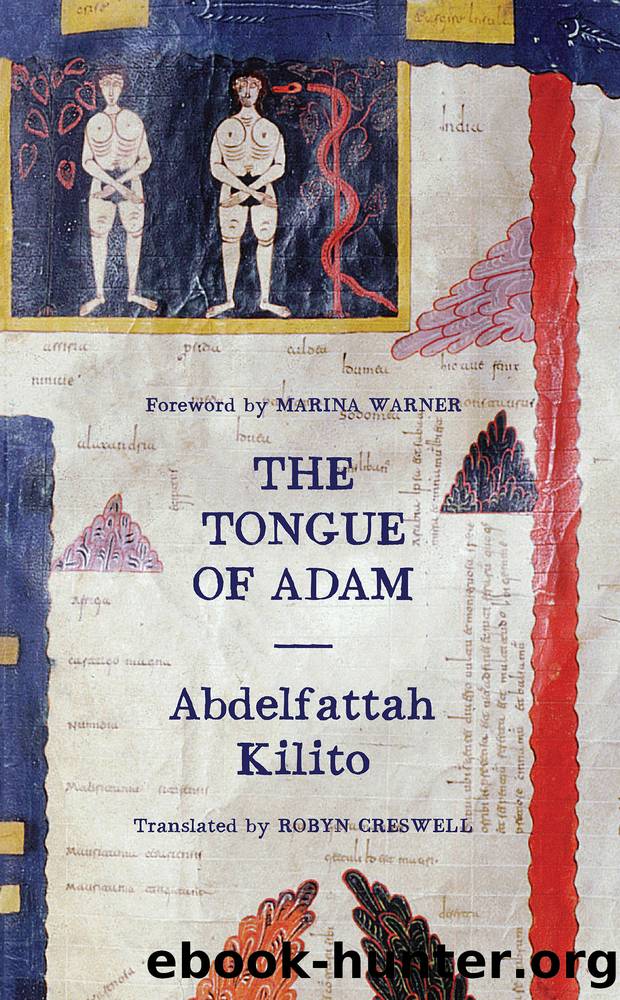The Tongue of Adam by Abdelfattah Kilito

Author:Abdelfattah Kilito
Language: eng
Format: epub
Publisher: New Directions
Published: 2016-10-26T11:33:09+00:00
Poet or Prophet?
Thaâlabiâs text poses three important questions: that of the elegyâs authenticity, that of its language (which is also Adamâs), and finally that of the elegyâs transmission.
According to Ibn âAbbas, cited by Thaâlabi, whoever claims that Adam wrote poetry is a liar.1 The prophets â and Adam is a prophet â cannot compose verse. It would be unworthy to lower themselves in such a way.
To see why this is so, let us recall the controversy between Muhammad and the pagans on the subject of Quranic inspiration. The pagans considered Muhammad a poet inspired by a djinn. This idea was founded on a long-standing belief that each poet has a supernatural familiar â a djinn providing poetic inspiration, for which the poet is merely a passive spokesman. The poet is a receptacle for words that inhabit him, which he delivers himself by speaking. He is possessed, prey to a strange and wild form of speech. In this way, the poem has two sources: a djinn, hidden inside a human body, and the owner of that body, which has been suddenly invaded and cannot free itself except by opening, without premeditation, into speech. The Meccan pagans believed that all this applied to Muhammad: he was possessed by a djinn that made him say the words whispered in his ear.
Several Quranic verses bear witness to this fierce debate: âAre we to abandon our gods to a crazed poet?â [37:36]. âBut how will remembering help them when a messenger, undeniable, had already come to them, and they had turned their backs on him, saying: âHe is tutored and crazedâ?â [44:14]. The Quran rejects the pagansâ accusation: âWe did not teach him poetry, nor does this befit himâ [36:69]. Prophecy and poetry are irreconcilable for they arise from antithetical sources of inspiration. In the same way, the status of prophet is incompatible with that of soothsayer (kahin), who receives his djinn-inspired vaticinations in rhymed prose (sajâ). âYou are not, by grace of your Lord, a soothsayer or a madmanâ [52:29]. Poetry and divination have a demonic origin, while prophecy has a divine origin. The Quran âis indeed a Revelation from the Lord of the Worlds, brought down by the Trustworthy Spirit, upon your heart, so that you may be a warnerâ [26:192â94].
If Muhammad isnât a poet then the other prophets, beginning with Adam, cannot be either. It follows from this that the poem attributed to Adam is a forgery.
As for the verses attributed to Eve, no one bothers to puzzle over them: Eve isnât a prophet after all. Nor does the poem attributed to Satan provoke discussion. Thereâs nothing strange about Satan composing verse, since heâs the very source of poetry. Does one not say that poetry is âthe breath of Satan,â nafth al-shaytan?2 Isnât it described in al-Maâarriâs The Epistle of Forgiveness as âthe Quran of Satanâ (Qurâan Iblis)?3
Download
This site does not store any files on its server. We only index and link to content provided by other sites. Please contact the content providers to delete copyright contents if any and email us, we'll remove relevant links or contents immediately.
| Hadith | History |
| Law | Mecca |
| Muhammed | Quran |
| Rituals & Practice | Shi'ism |
| Sufism | Sunnism |
| Theology | Women in Islam |
The History of Jihad: From Muhammad to ISIS by Spencer Robert(2621)
Nine Parts of Desire by Geraldine Brooks(2361)
The Turkish Psychedelic Explosion by Daniel Spicer(2354)
The First Muslim The Story of Muhammad by Lesley Hazleton(2268)
The Essential Rumi by Coleman Barks(2043)
1453 by Roger Crowley(2023)
The Last Mughal by William Dalrymple(1855)
Trickster Travels: A Sixteenth-Century Muslim Between Worlds by Davis Natalie Zemon(1847)
Muhammad: His Life Based on the Earliest Sources by Martin Lings(1644)
God by Aslan Reza(1639)
by Christianity & Islam(1627)
A Concise History of Sunnis and Shi'is by John McHugo(1567)
No God But God by Reza Aslan(1540)
Magic and Divination in Early Islam by Emilie Savage-Smith;(1533)
The Flight of the Intellectuals by Berman Paul(1501)
Nothing to Envy by Barbara Demick(1445)
Art of Betrayal by Gordon Corera(1429)
What the Qur'an Meant by Garry Wills(1391)
Getting Jesus Right: How Muslims Get Jesus and Islam Wrong by James A Beverley & Craig A Evans(1340)
